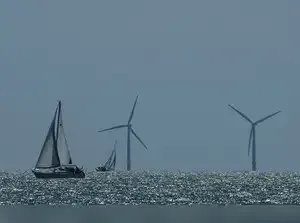Mitsubishi Corp-led consortia are preparing to withdraw from three offshore wind power projects in Japan's Chiba and Akita prefectures due to concerns over profitability, the Nikkei business daily reported on Tuesday.
Japan, the world's second liquefied natural gas (LNG) buyer after China, has turned to wind and solar energy as well as nuclear power station restarts to bolster energy security and achieve carbon neutrality by 2050.
In 2021, groups led by Mitsubishi were selected to operate three projects in the Akita prefecture in the north and the Chiba prefecture to the east of Tokyo, with total projected capacity of 1.76 gigawatt (GW) to be launched in 2028-2030.
A Mitsubishi Corp spokesperson told Reuters nothing had been decided, adding that the company is still examining its domestic offshore power projects.
Japan's industry ministry, or METI, could not be immediately reached for a comment.
Japan is targeting future offshore wind farm capacity of 10 GW by 2030 and 45 GW by 2040. It has held three offshore wind auctions, the first of which, for the projects in Akita and Chiba, was won by the Mitsubishi-led consortia.
Sources have said Japan was likely to sweeten terms for offshore wind developers, including foreign players such as Germany's RWE , Spain's Iberdrola and BP, as some other players decided to quit.
In a sign of commitment to the offshore wind industry despite Mitsubishi's issues, Japan's industry and land ministries on Tuesday proposed revising guidelines to extend offshore wind project leases by 10 years, from the current 30, to help developers manage soaring construction costs and complete projects.
In February, Mitsubishi said it was reviewing how to proceed with its offshore wind projects in Japan given a "significantly changed" business environment, showing Japan's vulnerability to rising costs across offshore wind projects globally.
Earlier this year, METI acknowledged the renewable energy rollouts could be behind the schedule, predicting that Japan's demand for LNG could be on the rise again as artificial intelligence booms, after years of decline.
Japan, the world's second liquefied natural gas (LNG) buyer after China, has turned to wind and solar energy as well as nuclear power station restarts to bolster energy security and achieve carbon neutrality by 2050.
In 2021, groups led by Mitsubishi were selected to operate three projects in the Akita prefecture in the north and the Chiba prefecture to the east of Tokyo, with total projected capacity of 1.76 gigawatt (GW) to be launched in 2028-2030.
A Mitsubishi Corp spokesperson told Reuters nothing had been decided, adding that the company is still examining its domestic offshore power projects.
Japan's industry ministry, or METI, could not be immediately reached for a comment.
Japan is targeting future offshore wind farm capacity of 10 GW by 2030 and 45 GW by 2040. It has held three offshore wind auctions, the first of which, for the projects in Akita and Chiba, was won by the Mitsubishi-led consortia.
Sources have said Japan was likely to sweeten terms for offshore wind developers, including foreign players such as Germany's RWE , Spain's Iberdrola and BP, as some other players decided to quit.
In a sign of commitment to the offshore wind industry despite Mitsubishi's issues, Japan's industry and land ministries on Tuesday proposed revising guidelines to extend offshore wind project leases by 10 years, from the current 30, to help developers manage soaring construction costs and complete projects.
In February, Mitsubishi said it was reviewing how to proceed with its offshore wind projects in Japan given a "significantly changed" business environment, showing Japan's vulnerability to rising costs across offshore wind projects globally.
Earlier this year, METI acknowledged the renewable energy rollouts could be behind the schedule, predicting that Japan's demand for LNG could be on the rise again as artificial intelligence booms, after years of decline.







